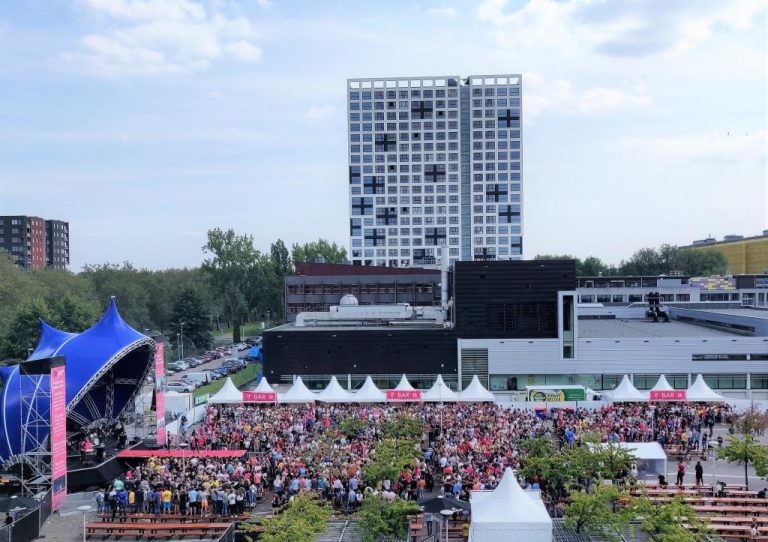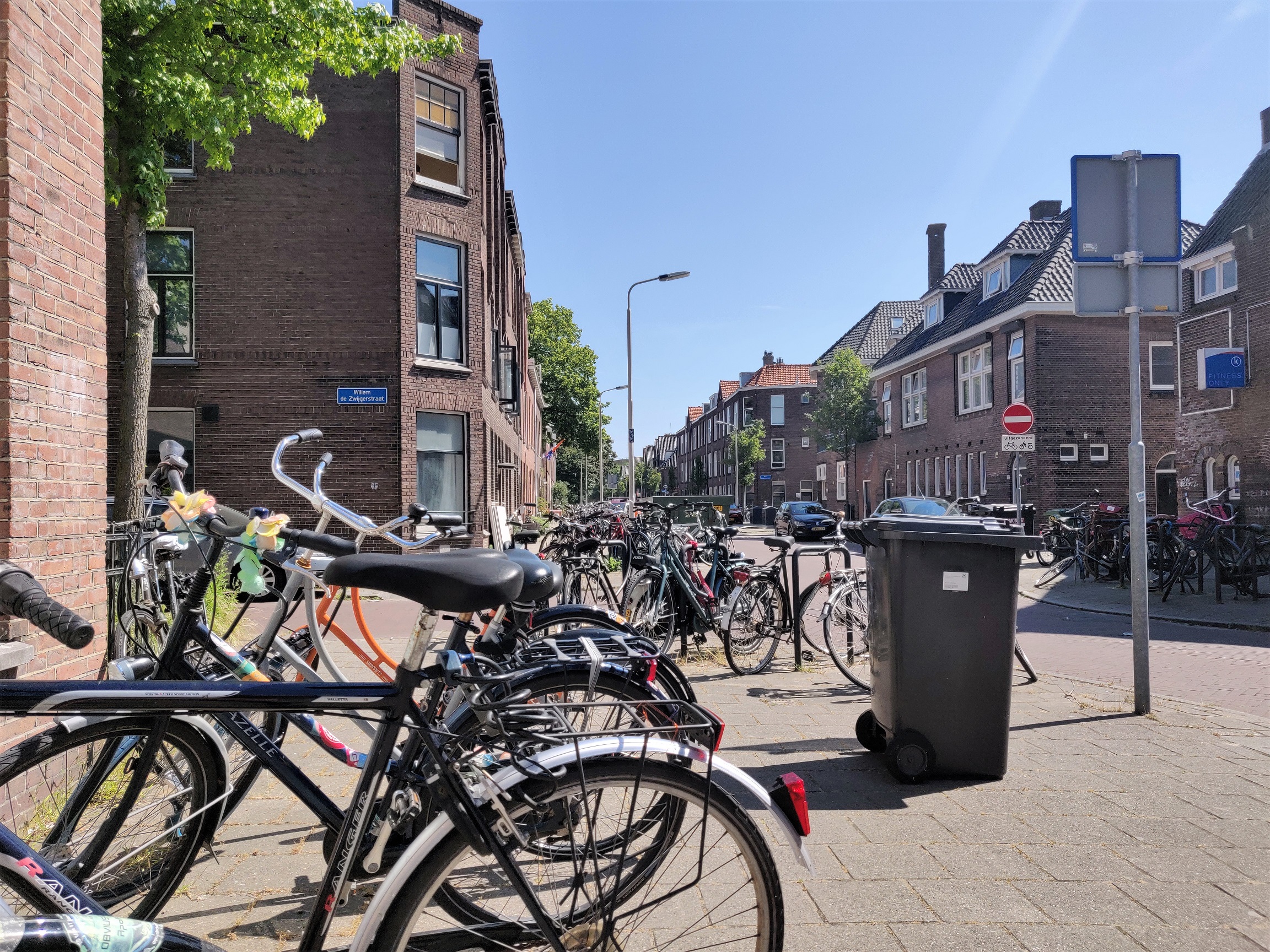Earlier this year, Wippolder gained notoriety after newspaper articles about student nuisance. Vice-rector magnificus Rob Mudde calls this kind of excesses antisocial.
In the Wippolder neighbourhood, the high number of students is causing a great deal of nuisance to residents. Anyone experiencing problems week in, week out can report this to the TU Delft. (Photo: Marjolein van der Veldt)
Terrorising students under the influence’, ‘vomit on the street’ and ‘drugs parties’. The headlines in articles in De Telegraaf and AD Delft newspapers did not mince their words. After reading the articles, Delta editors went into the Wippolder neighbourhood to talk to the residents and students. In response to written questions that Delta submitted to TU Delft, Vice Rector Magnificus Rob Mudde and Liaison Community Relations Alex Lokhorst stated that they would answer these in an interview.
You preferred to discuss these subjects in an interview. Why was that?
“It is a much more complex issue than people imagine when they read a short item in the newspaper. This is an extremely important issue for TU Delft and the city and I would much prefer to discuss it in a meeting,” explains Mudde.
What are you doing about antisocial student behaviour?
Lokhorst says that “We are investing time in creating a good understanding between all the parties, students and non-students involved. By talking to all student organisations, businesses, residents associations, shopkeepers and the hospitality sector. We are also talking to other relevant bodies such as DUWO, the Municipality and the police. We may not be responsible officially, but we do feel responsible.”
Mudde adds that “The difference between being and feeling responsible is also reflected in our discussions with student associations. The associations may not be directly responsible for problems caused in student houses, but they are a visible part of the student community and whatever happens, eyes are cast their way.”
You do not reach all students through discussions with student associations though.
“That’s true,” says Mudde, “given that only 30% to 40% of the students are members of associations. Some student houses that cause problems are mistakenly labelled as association houses. In these cases, we suggest to the associations’ boards that they drop by to talk to the residents anyway. I believe that you can ease half the problems if you do this at an early stage. As a community we have not arranged this properly with each other. I admit this immediately.”
Lokhorst continues. “It is for this reason that during the OWee we do a little ‘etiquette training’ of the first year students. We address mentors on their responsibilities and have compiled a list of conditions which clearly state what we expect from them. One example is to respect the routines of other residents. Since we started working this type of contract, we have seen a change in behaviour. This in turn affects the first year students that they mentor. It is a good start. You create awareness and trigger the feelings of responsibility among students for the couple of years that they live in Delft.”


How can you close the gap between the worlds of the students and the people of Delft? Students have a completely different framework of reference.
“I try to demonstrate it to students using a formula,” explains Mudde. “There are almost 20,000 students in this city and each one stays here for about six years. We get 3,000 new students every year. If they are divided into groups of 10 and each group causes trouble just once, there will be trouble every night of the year. After you graduate you may look back and think that it was not nice of you, but you then think that it was just once in six years. You may even smile at the memory. But for the people of Delft this is very different. They have to put up with students’ behaviour week in week out.
‘Do you want my unadulterated opinion? It is antisocial’
The difference in experiences was very clear when we went into the Wippolder neighbourhood. We heard positive stories about students as well as stories about vomit on the pavement, broken glass on the street, sleepless nights several times a week because of noise, and not wanting to discuss it with students anymore because the situation has become intolerable. If you hear this, what do you think?
“Do you want my unadulterated opinion? It is antisocial. We were all young once and know that when you are young you do not take things as seriously. You think that the others are being difficult or that it does not matter. But you must listen to residents if they are experiencing problems because of your behaviour. And if the neighbours complain to you after a party, you must apologise immediately. Socially aware students will give the neighbours a bunch of flowers. TU Delft abhors this antisocial behaviour. I’m not going to sweep it under the carpet. I will not defend students in any way in this issue. They don’t always deserve it.”
Do you have a message for these students?
Mudde continues. “Remember that your neighbours constantly have 19 year olds living next door. You will graduate and leave but they will get another 19 year old. The problems that you cause now will be repeated again and again. This is the crux of the matter. A single incident may not bother anyone, but this is a repetitive pattern. I believe that students – and certainly TU Delft students – must be accountable. You are not alone in the world. Being a good neighbour is not a request, it is an order.”
‘Should a situation really get out of hand, I will put my good suit on and drop by myself’
How can residents contact you if there are continuous problems?
Lokhorst says that “For many people, TU Delft is a large institution that they do not approach easily. To make things easier, we set up the Goede Buren (good neighbours, in Dutch) website. The platform also has an email address and we hope that this will make it easier.”
Mudde continues. “By the way, the platform is not a place to report problems. If the music is too loud, you really must contact the police. We cannot and do not want to do this type of enforcement. But we are there for people who have continuous complaints. Having to put up with a lot of noise once a year in a student city is irritating, but it’s doable. But having this week after week is unacceptable. Report it and we will discuss it with our students. Should a situation really get out of hand, I will put my good suit on and drop by myself.”
What is your experience? You live in the centre of town and are surrounded by students.
Mudde says “I live behind a girls’ house and it can be a lot of fun there on their flat roof. In our case the communication is good. I recently received a note with a couple of telephone numbers. They were giving a party and should there be too much noise, I could phone them. With student neighbours like this you can put up with it if they are noisy once in a while. In the end you need to find a way to get on with each other without waiting till the situation escalates to such an extent that nobody can express themselves anymore. So do not wait until you explode.”
Annebelle de Bruijn and Marjolein van der Veldt



Comments are closed.